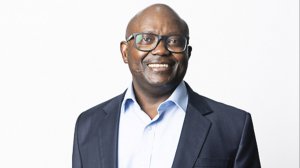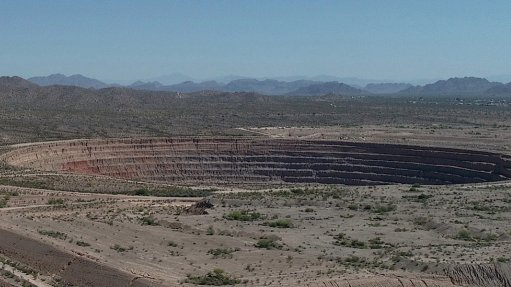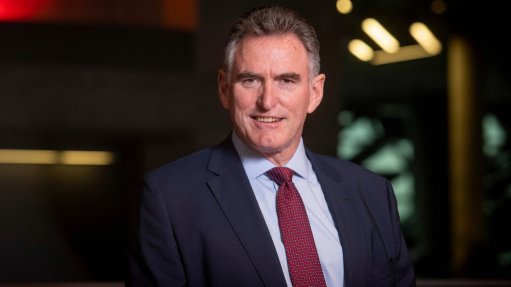IDC in discussion on the introduction of an exploration fund – Demana

IDC Mining, Metals, Infrastructure & Energy Head Reginald Demana interviewed by Mining Weekly’s Martin Creamer. Video: Darlene Creamer.
JOHANNESBURG (miningweekly.com) – The Industrial Development Corporation (IDC) is discussing the introduction of a fund to underpin much-needed exploration in South Africa.
This was stated by Reginald Demana, the IDC’s head of mining and metals, infrastructure and energy, in a wide-ranging Zoom interview with Mining Weekly. (Also watch attached Creamer Media video.)
“We, as the IDC, have been toying with the idea of an exploration fund. We are talking to the Department of Mineral Resources and Energy (DMRE) about supporting such an initiative. We are talking to our shareholder, the Department of Trade, Industry and Competition, about giving us facilitator status,” said Demana.
Demana goes into detail in the following question-and-answer interview with Mining Weekly, in which he also deals with the many potential benefits to the South African economy of the country going green as well as espousing the hydrogen economy.
He also deals with the importance in the short term of the mining industry benefiting from the security of energy supply, the fast-tracking regulatory applications and unlocking the logistical infrastructure so that it runs smoothly and consistently to increase export volumes.
Mining Weekly: What should South Africa do to ensure that we make the best of the current mining commodities upturn?
Demana: It is really three strategic business units that we cover, mining and metals as well as infrastructure and then energy. I think for the current commodities boom, everybody is talking about a couple of things. One, we’re talking about logistics, how we can get our logistics infrastructure working to maximise export of commodities, and that brings in partnerships between industry as well as Transnet Freight Rail. It also brings into play partnerships with Transnet, but on the port side. The new Transnet national ports authority, which is going to be a standalone subsidiary in a couple of months or years. Those partnerships are important to unlock the logistics infrastructure. So that’s very important for us as a country, not just for the current commodities boom, but going into the long term, we have to find a solution and bring in private investment into that area. The second one is really around if you take it back to the operations themselves, there it’s about regulatory certainty that people need. It’s all about the speed of processing the various regulatory licences and permits. You will have heard people talking about the time that it takes to turnaround an application for a prospecting right, a mining right and a water use licence. There’s been a lot of improvement between the Department of Mineral Resources and Energy (DMRE) working with Minerals Council South Africa to try and improve on those issues, led by the DG in the DMRE. Then, at the level of individual companies, there hasn’t been a lot of investment into supply. Of course, companies will cite the regulatory environment. They will cite infrastructure. But the other side of it has been the security of energy supply, which talks to renewable energy programmes, fixing Eskom and making sure that as a country we have a reliable consistent supply of energy on the back of which long-term investments, particularly of a long-term capital-return nature, can be made. In summary, I’m saying three things. One, security of energy supply. Two, the regulatory environment - fast-track of the processing of such applications. Three, unlocking the logistical infrastructure so that it runs smoothly, consistently and we can increase the volumes that we export.
What can be done to ensure the longevity of the industry by promoting particularly greenfield exploration?
Exploration is very important and I think it is also one of the workstreams that Minerals Council South Africa and the DMRE have. At the heart of it is the cadastre system, where we can record land parcel ownership, who owns what and where and the status of the various mineral rights, who is applying for what and when is it being processed. So the transparency of our minerals ownership, where it is as well as the availability of exploration data, championed by the Council for Geoscience such that if some exploration was done on a parcel of land and the right holder abandoned that, for whatever reason, somebody sitting anywhere in the world will be able to access it online, see that it is available and decide that they may want to invest, take a chance and take it further. Also, it means that in changing commodity cycles, when prices one day become favourable, somebody might decide to review the portfolio and what’s available in the country and decide to apply and invest. So a transparent cadastre system is key. Secondly, it’s this whole idea of how do we put investment into exploration. Do we bring into play specific exploration funds, which by their very nature will be equity because when you invest in exploration, you may not get your money out. More often than not, you don’t really get your money out because the hit rate from what you explore to a mine is very low. We, as the IDC, have been toying around with the idea of an exploration fund. We are talking to the DMRE about supporting such an initiative. We are talking to our shareholder, the Department of Trade, Industry and Competition, about giving us facilitator status so that that fund must have black economic empowerment (BEE) credentials and we can then go to the Minerals Council as well as the mining industry in general and get funding. So we crowd this funding seeded by the IDC and then we can invest into exploration. Of course, one of the attractive things if such a fund had BEE credentials is you might attract ESG funds from the companies. If it has BEE credentials on the other hand, and it is also going into exploration, it becomes a long-term beneficiary for the industry in general. What is in it for the company is apart from BEE credits it means that when more deposits are developed and are discovered, they also have a first right to bid for such projects, without necessarily spending a lot of time and resources on such development. We think that’s absolutely key. We trying to champion that as the IDC.
What metals and minerals should be targeted by exploration?
There are probably two broad categories there. One very important category is battery minerals, which includes vanadium, manganese, copper, tin, nickel and many others, of which South Africa, of course, has an abundance of some of them. Secondly, as a different category and that’s probably a category that backs the hydrogen economy. In the main there are platinum group metals (PGMs). We, as IDC, have a significant holding in PGMs. The country has abundant resources and reserves in PGMs and we do think that we can really sit as a champion to develop our hydrogen economy. Again, the greener minerals that go into batteries as well as the PGMs, mainly for the hydrogen economy.
What opportunities are presented by the country going green environmentally?
There are quite a lot of benefits. Of course, one, we talk about decarbonisation, reducing your own carbon footprint as a company and as a country and that’s why we are really behind renewable energy projects. There is also another angle of hydrogen placed into that also reducing the extent of the carbon footprint of different companies as well as the country. There is also another area. When you have things such as steel and cement, which are energy intensive areas of production, the more you bring in renewable energy the more efficient the energy production whether it’s through embedded generation or not, and make them greener, overall the country is better for it and you are decarbonising. There’s also another area of how do you replace diesel in mining operations, the most important being in trucking or haulage. Anglo is leading in that area with its hydrogen truck that it is piloting at Mogalakwena. I’m sure they will roll them out at the likes of Kumba Iron Ore and other areas. But increasingly the question is going to be asked about how diesel can be replaced with hydrogen. I’m sure some people will be trying to capture and convert gases and steam out of their own manufacturing processes into energy generation. So overall we are cleaning the environment, we’re reducing the carbon footprint and we're also becoming more efficient because that increases margins. But there is something else, and for me it was raised by Sibanye-Stillwater CEO Neal Froneman, who was saying that in the very near future, we are going to start seeing European countries, and maybe many other Western countries as well, saying to us that if you are selling products that have not been produced by clean energy, i.e. you are producing using coal energy, your product is not designated as clean, you can't sell into our markets. So it’s a market access issue. In other words., we are coming into a future when products deemed to have been produced from dirty energy will not have access to the market. So even if we have an abundance of resources here, the world will leave us behind. We need to catch up for the sake of access to markets. So it’s not only efficiencies, not only about cleaning our environment, it’s a market access issue, and I think we are moving very fast towards that future.
What role can South Africa and Southern Africa play in the hydrogen economy?
Let me walk you through how I think about hydrogen at the IDC. I look at it through the value chain of what we can do, and this is really a story about what the IDC does, and I want to take you through that with a focus on hydrogen. South Africa has an abundant resource and reserve base of PGMs. We mine that. That platinum must find its way into fuel cells and electrolysers. We have an opportunity to build a manufacturing base in this country to support that. So, the production of fuel cells also increases the demand for our platinum. Thirdly, in the production of hydrogen itself, we have an opportunity to serve the plants, using water resources everywhere we have them, to set up the plant to produce this hydrogen, using the electrolysers coming from our own platinum. We have abundant resources of wind and sun, which means the hydrogen that we produce can be green hydrogen because we are using renewable energy for that. So, from mining of platinum to setting up manufacturing capacity for fuel cells and electrolysers, to setting up manufacturing for the production of hydrogen using renewable energy as an input and therefore producing green hydrogen as a value chain, is very attractive to me and to the IDC. But lastly, when that hydrogen is there, what do we do with it? There are two channels. One, we can export it. There are many other advanced countries which are already, I think, ahead of us in terms of what they can use – Europe, in particular Germany. We can export to such countries in the near term. In fact, from a logistics perspective, we are talking about the Northern Cape and the Coega port, which can be used as a base for exporting hydrogen to European countries. But closer to home, we need to keep on increasing what we can use hydrogen on. Anglo is developing the so-called Hydrogen Valley, which is from Mogalakwena. You can have trucks operating there using hydrogen. You can have buses running along the N1 to Joburg and then running down the N3 to Durban, with refuelling stations along the way, which is why they call it the Hydrogen Valley. There are quite a lot of opportunities and I think near term probably export to countries that are ready such as Germany, and in the medium term to long term, developing our own internal consumption demand areas such as mining trucks and buses and so on and so forth.
IDC’s mining and metals strategic business unit covers traditional mining investments and on the metals side the IDC’s steel book includes Scaw Metals and mini mills spread around the country.
Infrastructure covers the typical infrastructure value chain of logistics, rail and ports as well as telecommunication towers and data centres.
Energy covers mainly public sector independent power producers as well as the private sector’s 100 MW embedded generation rollout.
Article Enquiry
Email Article
Save Article
Feedback
To advertise email advertising@creamermedia.co.za or click here
Press Office
Announcements
What's On
Subscribe to improve your user experience...
Option 1 (equivalent of R125 a month):
Receive a weekly copy of Creamer Media's Engineering News & Mining Weekly magazine
(print copy for those in South Africa and e-magazine for those outside of South Africa)
Receive daily email newsletters
Access to full search results
Access archive of magazine back copies
Access to Projects in Progress
Access to ONE Research Report of your choice in PDF format
Option 2 (equivalent of R375 a month):
All benefits from Option 1
PLUS
Access to Creamer Media's Research Channel Africa for ALL Research Reports, in PDF format, on various industrial and mining sectors
including Electricity; Water; Energy Transition; Hydrogen; Roads, Rail and Ports; Coal; Gold; Platinum; Battery Metals; etc.
Already a subscriber?
Forgotten your password?
Receive weekly copy of Creamer Media's Engineering News & Mining Weekly magazine (print copy for those in South Africa and e-magazine for those outside of South Africa)
➕
Recieve daily email newsletters
➕
Access to full search results
➕
Access archive of magazine back copies
➕
Access to Projects in Progress
➕
Access to ONE Research Report of your choice in PDF format
RESEARCH CHANNEL AFRICA
R4500 (equivalent of R375 a month)
SUBSCRIBEAll benefits from Option 1
➕
Access to Creamer Media's Research Channel Africa for ALL Research Reports on various industrial and mining sectors, in PDF format, including on:
Electricity
➕
Water
➕
Energy Transition
➕
Hydrogen
➕
Roads, Rail and Ports
➕
Coal
➕
Gold
➕
Platinum
➕
Battery Metals
➕
etc.
Receive all benefits from Option 1 or Option 2 delivered to numerous people at your company
➕
Multiple User names and Passwords for simultaneous log-ins
➕
Intranet integration access to all in your organisation



















